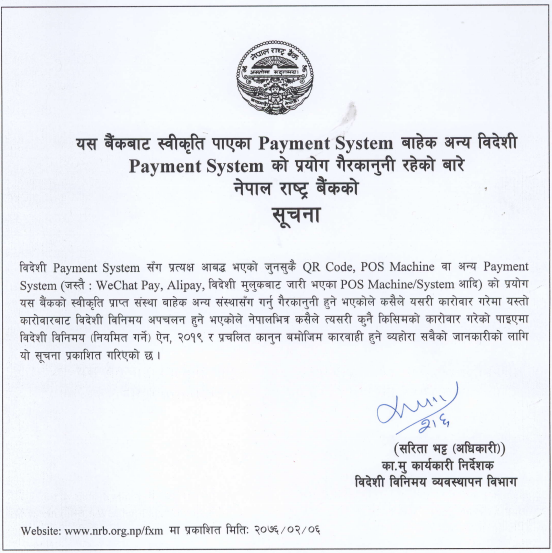About a month ago (on 17th April), The Himalayan Times reported a news story about the prevalent use of Chinese Payment systems in Nepal. Chinese tourists who came to Nepal apparently use services like Wechat pay and Alipay to pay whenever possible.
Some hotels and restaurants that focus on Chinese customers have been found to even encourage this practice by putting a QR code in their bills that you can scan with your phone to pay the hotel/restaurant via those services. This means that payment services like WeChat Pay and Alipay are being used in Nepal without any one of them taking permissions from the authorities.
According to a banker who spoke anonymously to The Himalayan Times, the use of these Chinese digital wallets is prevalent in Nepal.
What’s the real concern?
This is a real concern because this means that the money that Chinese tourists are spending (Chinese people are considered big spenders) isn’t entering Nepal at all. The main reason that a country wants a tourist to visit their country is for the massive cash in-flow but these unregistered are letting the tourists and the businesses to bypass Nepal’s market. This severely affects our economy.
The problem starts to look more severe when we consider that Wechat pay and Alipay together have more than 1.7 billion users. That staggering number means that nearly every Chinese tourist that enters Nepal probably uses one of those services.
Nepal Rastra Bank Notice
The central bank of Nepal, Nepal Rastra Bank, said that it had been notified about the situation before and some bankers complained, at the time when this news broke out, that the Rastra Bank did nothing to stop this.
But after a month, Nepal Rastra Bank has issued a notice condemning the use of payment services other than those that have got permission from the Bank. The notice said that the use of these unregistered payment systems will be considered illegal. If anyone is found using these services, they will be punished according to the prevalent law.
However, Rastra Bank has also said that it is looking to legalize the use of those services in Nepal since Chinese tourists are the second largest cohort of foreigners visiting the country and it is in the interest of both parties to legalize these services.
But to do that, those Chinese payment systems must first register in Nepal. If they don’t register then a company registered in Nepal should act as an intermediary. An NRB official told The Himalayan Times that two different companies have proposed to become such intermediary but NRB hasn’t granted them permissions because they couldn’t meet the requirements set by NRB. What are those requirements? We don’t know yet.
But the problems don’t stop there. These payment systems allow peer-to-peer fund transfer feature. This means that if the parties taking part in the transaction are both Chinese, they can transfer funds between each other by bypassing these intermediaries. The only solution for this problem is by deploying a geofencing technology (blocking the use of the services outside China). This has to be done by the digital wallet companies themselves.
We don’t know if companies like Wechat and Alipay will work with Nepal to solve this problem. But we will have to wait and see.
-
TechLekh Awards: Best Phones of 2025 in Nepal Winners!Ooooooooooh boy, what a year it was for smartphones, even in Nepal! Phones have been…
-
TechLekh Awards: Best Tablets of 2025 in Nepal Winners!The smartphone scene in Nepal was absolutely crackling this year with constant new launches and…
-
TechLekh Awards: Best Scooters of 2025 in Nepal Winners!Scooters have played a major role in shaping everyday mobility in Nepal. They have always…
-
TechLekh Awards: Best Bikes of 2025 in Nepal Winners!Motorcycling in Nepal has always meant more than just getting from one place to another.…
-
TechLekh Awards: Best Cars of 2025 in Nepal Winners!Electric vehicles continue to dominate Nepal’s market in 2025, and Chinese manufacturers still lead the…
-
Skoda Kylaq Launched in Nepal: Skoda’s Most Realistic Attempt at Staying RelevantHIGHLIGHTS Skoda Kylaq price in Nepal starts at Rs. 45.90 Lakhs. It has been launched…
-
OPPO Reno15 Launching in Nepal Tomorrow: First Proper Reno Phone in YearsHIGHLIGHTS The OPPO Reno15 price in Nepal is expected to be Rs. 91,999 (12/512GB). The…
-
Xiaomi Pad 8 Finally About to Hit Global Market: And It’s Even Better than Pad 7HIGHLIGHTS Xiaomi Pad 8 price in Nepal could start from Rs. 53,999 for the 8/128GB…






















